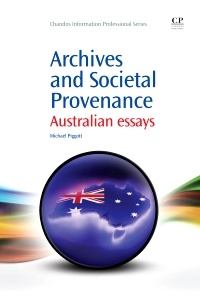Archives and Societal Provenance Australian Essays Chandos Information Professional Series

A prologue to the afterlife
Acknowledgements
About the author
Chapter 1: Introduction: societal provenance
Abstract.
Terroir, culture and the individual
The aura of societal provenance
Australia and the Australian people
Other terminology
Applying societal provenance
Part 1: History
Chapter 2: Themes in Australian recordkeeping, 1788–2010
Abstract.
British recordkeeping legacy
The governing machinery
Immigrant nation
The ordinary Australian: free immigrants and soldiers
Conclusion
Chapter 3: Schellenberg in Australia: meaning and precedent
Abstract.
Assessing Schellenberg’s visit
Impact on the Paton Inquiry, and on Schellenberg
Political use
Cultural cringe
Impact of later visitors
Chapter 4: Archives: an indispensable resource for Australian historians?
Abstract.
The three-stage discovery model
Just how important are archives?
The Australian archives-history nexus
In summary
Chapter 5: The file on H
Abstract.
Part 2: Institutions
Chapter 6: Libraries and archives: from subordination to partnership
Abstract.
The setting – the 1950s
Schellenberg and the Paton Inquiry
Librarians’ guest, archivists’ hope
National Library Inquiry Committee
Inquiry membership
The inquiry supports separation
The arguments
Other later developments
Chapter 7: Making sense of prime ministerial libraries
Abstract.
Meanings
Benefits
Challenges
Conclusion
Chapter 8: War, sacred archiving and C.E.W.Bean
Abstract.
The setting
Archives
What it all meant
Part 3: Formation
Chapter 9: Saving the statistics, destroying the census
Abstract.
Conducting the census
Confidentiality
The current debate
Supporting destruction
The case for retention
Claim and counter-claim
The independent inquiry
Reflections
Chapter 10: Documenting Australian business: invisible hand or centrally planned?
Abstract
Handicaps and solutions
Conditioning factors
Chapter 11: Appraisal "firsts" in twenty-first-century Australia
Abstract.
Trust and Technology
Appraising census forms
Business archives
Australian Society of Archivists
In summary
Part 4: Debates
Chapter 12: Two cheers for the records continuum
Abstract.
The early to mid-1990s
Monash University
Frank Upward
The Australian audience
Abstractions, words and diagrams
Accolades and assessments
The inevitable limits of continuum theory
Chapter 13: Recordkeeping and recordari: listening to Percy Grainger
Abstract:
Percy Grainger
Rose Grainger
The recordkeeper
Finding an archives host
A convenient form of artificial memory
The Remembrancer
Rich archive, wretched memory
Memory-dependent recordkeeping
Chapter 14: Alchemist magpies? Collecting archivists and their critics
Abstract.
Historian friends
Sir Hilary Jenkinson
Chris Hurley
Richard Cox
A partial rejoinder
The collecting archivist
The results of collecting: it hardly matters
The results of collecting: it matters
Chapter 15: The poverty of Australia's recordkeeping history
Abstract.
Acquisition
Destruction
Problems with traditional history
Criticism 1: it starts only in 1788
Criticism 2: a dated notion of what archives are and what archivists do
Criticism 3: the neglect of recordkeeping systems history
Criticism 4: the absence of a history of the record
Conclusion
Chapter 16: Acknowledging Indigenous recordkeeping
Abstract.
Definitions
The need for new definitions
Tanderrum
Message sticks
Cognitive records, Dreaming archives
Towards an inclusive Australian archival science
Epilogue: an archival afterlife
Reference
Index
- Presents material from a life’s career working and thinking about archives and records and their multiple relationships with history, biography, culture and society
- The first book to focus specifically on the Australian archival scene
- Covers a wide variety of themes, including: the theoretical concept of the records continuum; census records destruction; Prime Ministerial Libraries; and the documentation of war
Date de parution : 10-2012
Ouvrage de 358 p.
15.5x23.2 cm
Épuisé
